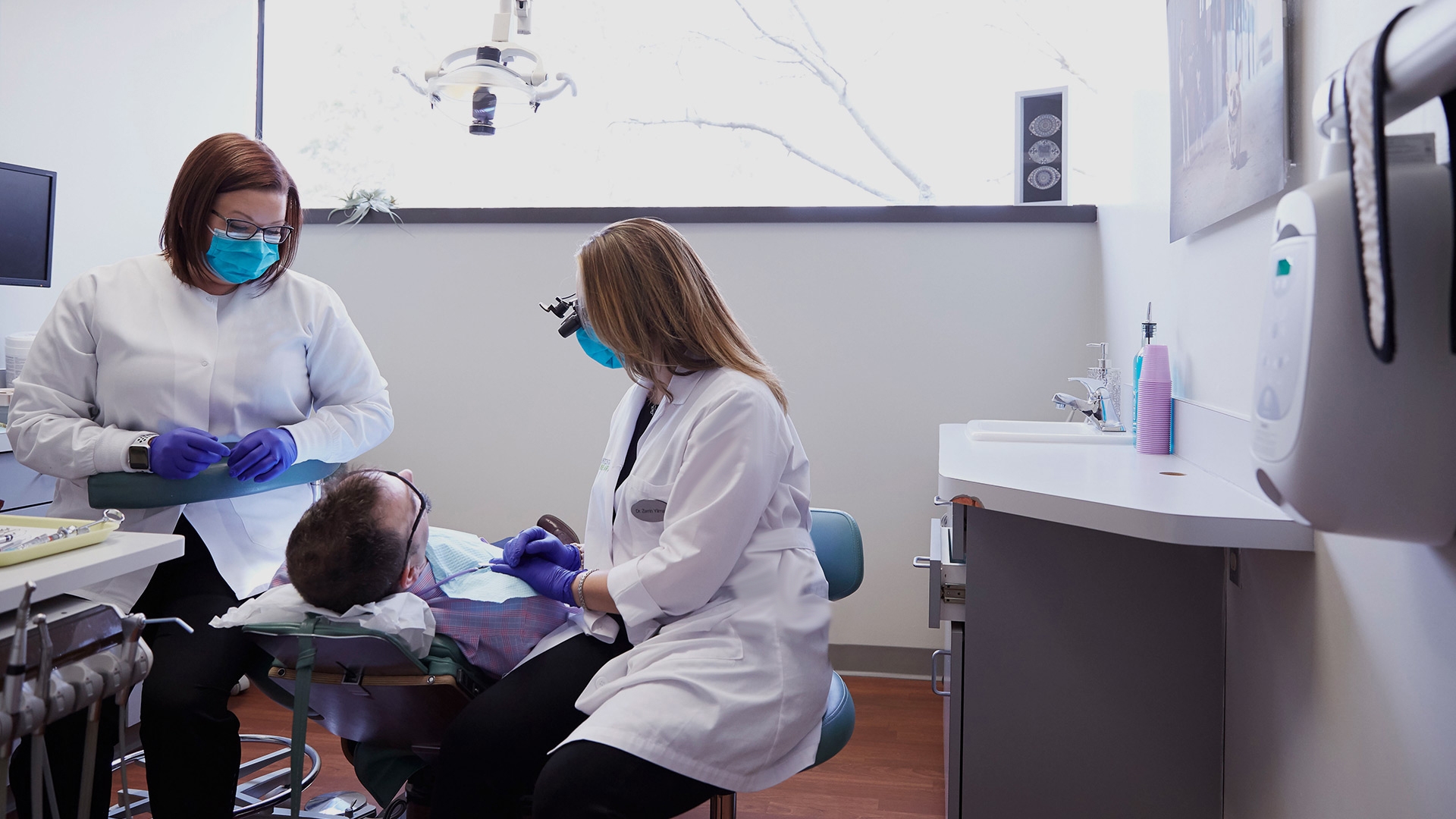
Been putting off the dentist? Here’s what to expect
Dental offices have always been held to high standards of cleanliness. This has been especially true during the pandemic, when additional steps were taken to prevent the spread of COVID-19.
Yet despite dental offices implementing even more stringent safety protocols, patients have been hesitant to return; surveys of Michigan dental practices found that more than 35% of respondents consistently reported lower than usual patient volume in the past year.
Unfortunately, when you push off your dental appointment you run the risk of letting dental issues worsen over time. As patients slowly return, we are encountering situations where a patient is faced with extensive dentistry, including tooth loss, which could have had other alternatives and outcomes with earlier intervention.
If you’ve avoided visiting the dentist, you should be aware of what to expect at your next appointment, including possible changes to your oral health.
Overdue for your dental visit? Request an appointment here.
As customary, a thorough examination
Patients with a long break between dental visits can expect a thorough examination to check for signs of gum disease, cavities, and other oral health issues. This preventative dentistry is critical to identifying issues before they escalate into problems requiring more extensive dentistry, such as tooth loss and periodontal disease.
Depending on how long it’s been since your last visit – and your current dental health – your dentist may recommend doing dental X-rays, as there are things that can only be revealed by radiographs. According to the ADA, “Dental X-rays are a useful diagnostic tool when helping your dentist detect damage and disease not visible during a regular dental exam.” Patients with a high risk of dental problems or signs of oral disease can benefit from this deeper look at their oral health.
At DGY Dentistry, we use advanced 3-D imagery to discover problem areas and define treatment choices more easily, allowing more efficient action for restorative intervention.
Increased stress on teeth
A study in the Journal of Clinical Medicine found a rise in orofacial pain during the pandemic, as well as increased cases of jaw clenching during the day and teeth grinding at night. Patients returning to the dentist may find that they’ve been putting increased stress on their teeth, which can cause sensitivity, flatten teeth, and lead to a duller smile over time.
A dentist can help assess whether you’ve been grinding your teeth and if a preventative measure like a mouthguard is needed. In cases of severe, long-term grinding you may need porcelain or resin (bonding) restorations to correct any snipped or broken edges that may have occurred.
Learn how to stop teeth grinding here.
The possibility of a higher rate of decay
If you’ve gone too long between dental visits and haven’t been practicing other preventative dental habits, you may be facing a higher rate of tooth decay.
Without proper oral hygiene, plaque can build up over time leading to decay. Advanced cases can lead to periodontal “gum health issues” and when left untreated can affect bone health and tooth loss. In fact, the leading cause of tooth loss in adults is gum disease, and older adults are particularly susceptible.
- 47.2% of adults aged 30 years and older have some form of periodontal disease
- 70.1% of adults 65 years and older have periodontal disease
Your dentist can evaluate the health of your teeth and gums to determine the rate of decay (if any) and what can be done to correct it. This can range from an in-depth teeth cleaning to filling cavities and/or regenerating lost gum and bone tissue. In the case of loose teeth, your dentist will need to rebuild a healthy framework with periodontal (gum) care and replace the missing tooth with a dental implant.
Bonus: Enhanced safety protocols
Dental offices are known for their strict health and safety protocols. Returning patients can expect even more precautions during the pandemic.
The Center for Disease Control (CDC) released guidance for dental settings during the COVID-19 pandemic, which factored in the unique characteristics of dental settings and their “specific infection control considerations.” Recommended protocols include screening for symptoms of COVID-19, following the CDC, as well as local official’s, recommendations for the use of face masks in health settings whether vaccinated or not, along with encouraging physical distancing.
At DGY Dentistry, we have operated with extreme caution during the pandemic. In addition to following CDC guidelines, our Ann Arbor dental office has implemented even more disinfection protocols to provide the safest dental environment for our patients. Our practice has been employing air purifiers throughout the office, external suction devices to remove aerosols produced during procedures, and a disinfecting fogging system deployed in each operatory following every appointment. We have provided the best PPE gear available to our staff and are pleased to report we have not had any transmission of the virus.
State and CDC guidelines may change as time goes on, and exact precautions can vary by dental office. Contact your dentist if you have questions about their current safety protocols.
Scheduling early to prevent dental problems
We encourage everyone to remain on schedule for their preventive visits. The vast majority of patients have significant dentistry they want to protect, and the best way to do so is through regular dental appointments.
Although it can be intimidating to return to the dentist after a long break, we are not here to judge, it’s important to be proactive about your dental health and address any problems as soon as possible. Early intervention is key to preventing costly and time-consuming dental issues.
At DGY Dentistry, we pride ourselves in clearly communicating your procedures and choices with no-pressure consultations and transparent payment options.



